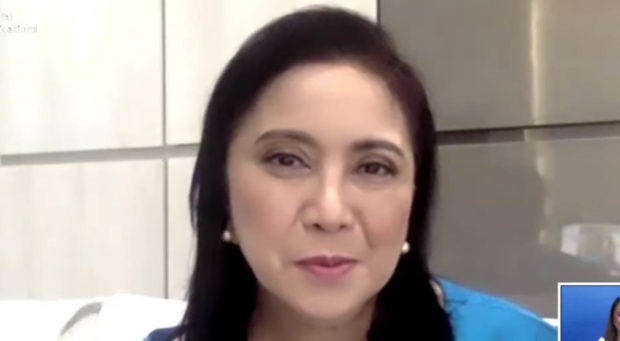MANILA, Philippines — In under 15 minutes, Vice President Leni Robredo did what President Rodrigo Duterte did not in his nearly three-hour, final State of the Nation Address: place the country’s pandemic response front-and-center especially amid the growing surge of Delta variant transmissions.
More importantly, she drew attention to a “truth that must be affirmed by any leadership”: that most of the country’s pandemic and disaster efforts were actually propped up by ordinary Filipinos who had volunteered, donated, helped organize across the country.
In a speech on Tuesday, Robredo called on the government to direct its “laser-like focus” toward thwarting the COVID-19 pandemic and to do away with politicking and divisive rhetoric, so the country can finally get on track to recovery.
‘No other priority’
“There should be no other priority but the pandemic and its effects,” she said. “This should be mirrored in our budgets, in the agenda of every meeting within government, in every memo cascaded down the bureaucracy.”
“If we need to put up billboards and tarps, let it be about staying safe from illness. If need the services of a battalion of graphic artists, let it be for a vaccination drive. When passing new laws, let it be for funds and a stronger system to combat the pandemic,” she added.
Robredo has been hammering on this message for over a year now, much to the irritation of the Palace, which has accused her of grandstanding or of belittling the country’s recovery efforts.
But so far, almost none of the recommendations she had laid out in the early part of the pandemic—to promote mass testing, to plan vaccine procurement and rollout, and to fill in the gaps of its sociodevelopment programs—were implemented by the administration.
President in absentia
In contrast, the Office of the Vice President has been steadily rolling out programs of their own: a jobs-matching platform and apprenticeship programs for workers, learning hubs for students, and vaccine and swab expresses to contain community transmissions in local governments.
Because the OVP does not have a large budget or expansive political machineries, she said, the OVP has come to rely on “trust; our machinery, a people willing to give themselves.”
This was actually the prevailing public sentiment when Taal Volcano first erupted in January last year, and again when three consecutive typhoons struck the country. Government response and aid were slow and the President was in absentia; meanwhile, the OVP had been singlehandedly managing the disaster and relief efforts.
Each time the OVP called for help “for time; for donations, in cash through our partners or in kind; for knowledge and advice that you continue to give — the Filipino never failed us; always, the positive response was overwhelming,” Robredo noted.
“We made it through the past year and a half only because of the strength we gave each other,” she added.
Now 500 days into the quarantine, the government needs to implement new and better policies: a faster and integrated system for testing, tracing and treatment; direct vaccine deliveries and passing the Bayanihan 3 to provide aid to starving families, she said.
But “aside from laying down policies, we know that government has another very important responsibility: To orient us towards a single direction; to remind us that whatever our disagreements, we are ultimately one nation,” she said.
“No one else but us gets infected, no one else but us suffers, no one else but us gets stalled on the road to progress,” she added.
